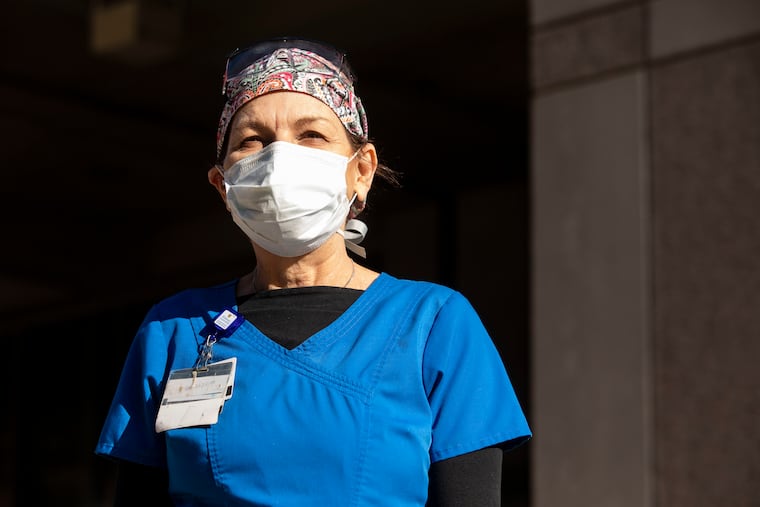Exhausted, traumatized nurses are still fighting, even as COVID-19 cases decline | Expert Opinion
Nurses are still in a crisis—a crisis of cutbacks.

As the doors swing open to Temple University Hospital’s COVID-19 ICU, where I have worked during this awful pandemic, memories from the last 14 months sweep over me. These memories are burned into my psyche and, I fear, are now as much a part of me as my arm, the set of my eyes, or a strand of my DNA. Since the pandemic arrived in 2020, health-care workers have stepped up and delivered lifesaving care under the most difficult circumstances of our careers — circumstances that have changed us and our profession in lasting, indelible ways. As the COVID-19 census in the hospital decreases and the world begins to open up, most people feel hopeful. Frontline nurses and health-care workers — those of us who were called heroes — are still reeling.
I no longer start my shifts wondering, who will die today? I start my shifts thinking of those who already have.
COVID-19 exposed the callous nature of the for-profit health-care system in this country. Nurses and ancillary staff paid a steep price for the failure of administrators to be prepared for pandemic conditions and to protect us with ample and appropriate PPE (personal protective equipment like masks). More than 3,600 nurses have died of COVID-19, and it has been difficult to mourn their deaths during the crisis. Now that we are coming up for air, their absence is acutely felt at nurses’ stations, in hospital halls, and at bedsides across the country.
» READ MORE: Who will die today? A nurse’s typical day in the COVID-19 ICU. | Expert Opinion
Many nurses lost family members. Some contracted the virus and infected their families. And, of course, we lost so many patients at the bedside.
Typically, when a patient dies in the ICU, the nurse facilitates the experience for the family. Sometimes care is withdrawn, and the family is at the bedside when their loved one passes. Other times, the nurse prepares the patient for the family to say goodbye after the patient has already died. The nurse is an observer.
During the pandemic, nurses were alone with their very ill and dying patients. We were a stand-in family, active participants in patients’ deaths as family members were forced to say goodbye via telephone. It was a profoundly sad experience, and it happened a few times a week instead of a few times a year. It’s going to take a long time for us to heal and move on from these tragedies. We are still struggling with grief, exhaustion, and PTSD. Many of us have left the profession and I suspect that trend will continue as, post-pandemic, hospitals continue to expect staff to do more with less — if we could do it then, why not now?
The stress and moral injury we feel each day do not allow us to heal and move on from the difficult year. Temple University Health System boasted a profit of $89 million in 2020. Still, hiring has been slow, and nurses continue to quit or retire faster than they can be replaced. Day- and night-shift nurses fill out paperwork alerting the hospital to the staffing crisis, to no avail. And although we have fewer COVID-19 patients than we had during the peak of the crisis, we still have many patients, fewer nurses, and visitation is still restricted. There are no families at the bedside to keep an eye on their loved ones and alert the nurses and doctors to potential problems.
» READ MORE: Inside Philadelphia's busiest COVID-19 hospital
The situation at the bedside continues to be frenetic, and patient care suffers under these conditions. We may no longer be in the midst of a pandemic, but make no mistake: We are still in a crisis — a crisis of cutbacks.
Exhausted or not, nurses will continue to advocate for our patients and to call for more staff, because we know that safe, appropriate staffing saves lives. We will always push back against corporate greed because that’s just what we do, whether we’re in the midst of a pandemic or not. But we need your help.
The public must speak up and push back. We need patients and their families to demand that management and for-profit hospital systems put the “care” back in health care. Believe me, you’ll be heroes for it.
Mary Adamson is an ICU nurse at Temple University Hospital and the president of Temple University Hospital Nurses Association. She has been a bedside nurse for 25 years.